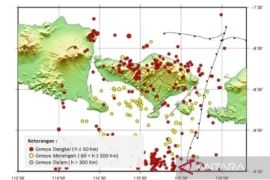Bogor, W.Java (Antara Bali) - A research team from West Java's Bogor Agriculture Institute (IPB) is producing protease from the fruits and leaves of Noni (Morinda citrifolia L.), locally named mengkudu, a research team member Dwi Ishartani stated here, Thursday.
Protease is an enzyme that performs proteolysis, which means that it initiates protein catabolism by hydrolysis of the peptide bonds that link amino acids together in the polypeptide chain forming the protein.
"In 2013, the world's enzyme market was forecast to reach US$7 billion, with demand increasing by 6.3 percent per year," Dwi affirmed. She explained that the Noni fruit is very popular in the Southeast Asian region and the Pacific and Caribbean Islands, including Indonesia.
In Indonesia, the fruit has been widely used in traditional medicine to cure worm disease, abscess, thrush, teeth disease, bruises, rheumatic diseases, stomach ache, hypertension, and other diseases. Protease plays an important role in the maturation and multiplication of cells as well as the synthesis and turnover of collagen in the skin's wound-healing process.
"Higher protein contents are found in the second aging level as compared to that in the fourth aging level, and in the shoot as compared to that in the leaf base," Dwi explained. "Protease extracted from Noni fruits and leaves is one of the commercial enzyme sources," Dwi said.
The research on the extraction of protease from Noni fruits and leaves titled, "Extraction of Protease from Noni Fruit and Leaf" was published in the Journal of Technology and Food Industry in 2011. This study was conducted by Dwi Ishartani, Elfi, Nuri Andarwulan, and Dahrul Shah from IPB. (WDY)






